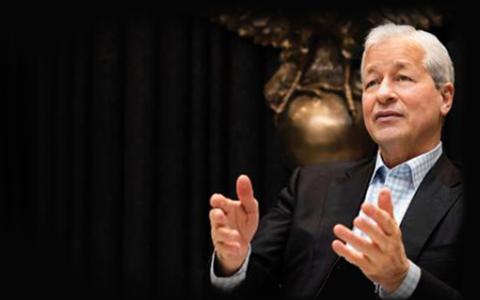
(Yahoo! Finance) - JPMorgan Chase (JPM) CEO Jamie Dimon said the Trump administration’s new tariffs will produce short-term inflation and "slow down growth" but whether they cause a recession "remains in question."
He made the remarks in a new 59-page shareholder letter on Monday, where he warned of the many uncertainties from the sweeping trade policies on investments, capital flows, corporate confidence, and the US dollar.
"The quicker this issue is resolved, the better because some of the negative effects increase cumulatively over time and would be hard to reverse," Dimon said in a section on the state of the economy titled "We're not in Kansas anymore."
"In the short run, I see this as one large additional straw on the camel’s back,” Dimon added.
Some of the biggest names on Wall Street are issuing new warnings about the impact of what would be the steepest new set of tariffs in more than 100 years, a development that is shaking markets and unnerving some of the world's biggest investors.
Billionaire Bill Ackman, who supported Trump during the campaign, on Sunday called for the president to press pause on the tariffs for 90 days.
"I strongly believe launching tariffs on April 9th against the entire world — massively in excess of what we are being charged — is a mistake," he said on X. Ackman runs Pershing Square Holdings (PSHZF).
Another billionaire investor, Stanley Druckenmiller, wrote on X that "I do not support tariffs exceeding 10%." Druckenmiller, a longtime Republican, used to oversee current Treasury Secretary Scott Bessent when both were at George Soros’s hedge fund.
Another voice of caution came from hedge-fund manager Dan Loeb, who noted on X that there were conceptual and practical errors in the administration's tariff policy and predicted "it will be a test of the administration’s judgment versus ideology how they resolve this over the weekend or coming days."
JPMorgan's chief US economist, Michael Feroli, became the first major Wall Street bank researcher to predict a recession this year on Friday. Feroli attributed the call to “the weight of the tariffs."
Dimon in his letter stopped short of predicting a recession but noted that what had been a healthy economy "was already weakening" before Trump's tariff announcement.
He also questioned the source of the country’s “exceptional economic performance” over recent years, saying at least “part of this performance has been driven by extraordinary deficit spending and the quantitative easing that took place” since the Covid-19 pandemic.
At the same time, he praised some of the international economic alliances that emerged in the wake of World War II and noted that his "most serious concern" with tariffs is "is how this will affect America’s long-term economic alliances."
"If the Western world’s military and economic alliances were to fragment, America itself would inevitably weaken over time," he added.
In the short term, Dimon said to expect higher prices. "We are likely to see inflationary outcomes" from the tariffs, "not only on imported goods but on domestic prices, as input costs rise and demand increases on domestic products."
And the economy will slow, he added. "Whether or not the menu of tariffs causes a recession remains in question, but it will slow down growth," he wrote.
JPMorgan stock plunged on Thursday and Friday, along with shares of the rest of the big banks, and is set to fall again on Monday. It is now down 27% from its Feb. 19 peak.
An index tracking the larger US banking industry (^BKX) also dropped 15.5% on Thursday and Friday, its worst two-day performance since March 2020.
On Friday JPMorgan will release its first quarter results as bank earnings season gets underway. Investors will want to hear how the tariff uncertainty is affecting some of Wall Street's biggest businesses as hopes for an IPO bonanza and M&A boom are being put to the test.
Amid the turmoil of this past week, StubHub and Klarna (KLAR.PVT) decided to postpone their IPO roadshows, while another fintech company called Chime (CHIM.PVT) delayed its plans to go public, according to the Wall Street Journal.
Executives at JPMorgan, Goldman, and Bank of America, as a result, are already considering revising down revenue for their M&A advisory businesses, according to Bloomberg.
Big banks will be tested in other ways if market watchers are right about the increased odds of a US recession and rising inflation, since both will create new challenges for the lenders and their customers.
Dimon used his letter to sound off on a number of other topics — including how to improve the US tax, education, healthcare, and retirement systems as well as the country’s need for continuous infrastructure investments and affordable housing, plus some management advice.
But he offered no new guidance on when he plans to retire. He told analysts in January that his base case was a few more years running the nation's largest bank.
Dimon did, however, point out that he is far from perfect. He said he has made some big mistakes in his career, including JPMorgan’s London Whale saga, in which the company lost billions in 2012.
He never mentions the name of Trump in his letter, even while discussing his policies. Dimon avoided endorsing either presidential candidate last year, though he was in regular dialogue with close advisers to both Trump and former Vice President Kamala Harris.
"Two things are absolutely foundational to the long-term success of JPMorganChase: one is whether we run a great company and two, which is maybe more important, is whether the long-term health of America, domestically, and the future of the free and democratic world are strong," Dimon said.
David Hollerith - Senior Reporter



